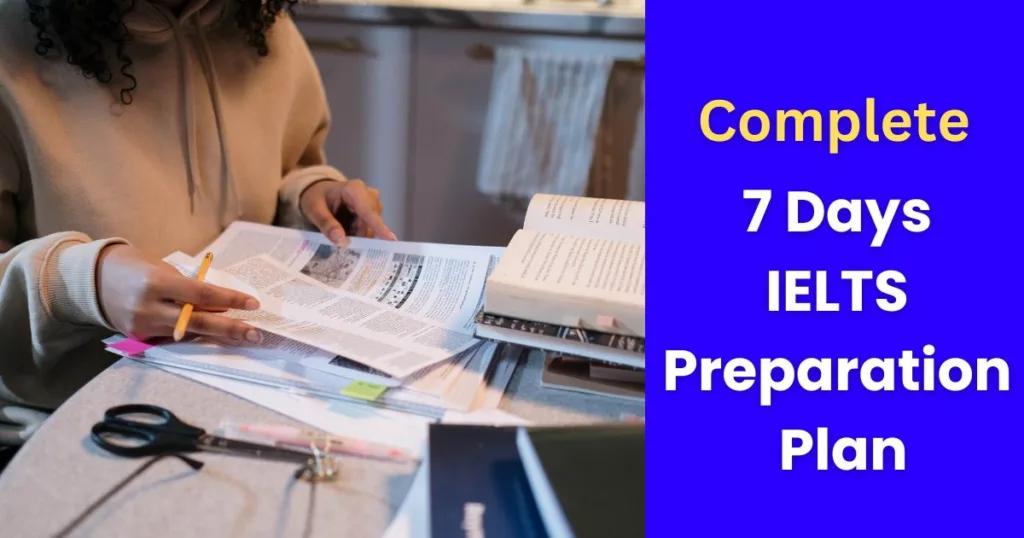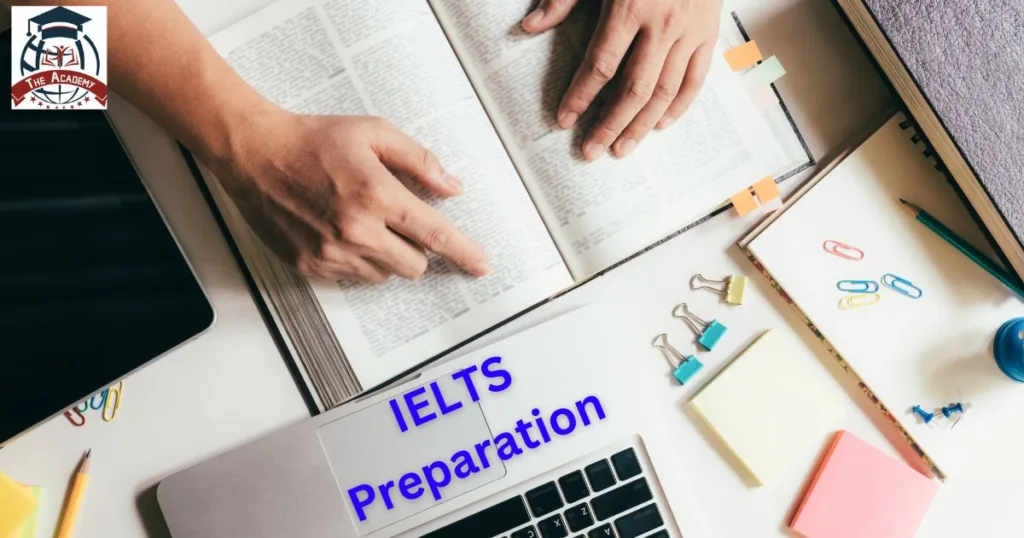If you are limited on time to get ready for the IELTS test and aiming for top scores, here’s a Comprehensive Guide for Preparing IELTS Exam in 7 Days 2025.

Table of Contents
Day 1: Comprehensive Understanding and Initial Assessment
Morning:
- Test Format Familiarization: Start by understanding the overall structure of the IELTS test, including the duration, scoring, and types of tasks you’ll encounter in each section (Listening, Reading, Writing, Speaking). Familiarize yourself with the band descriptors and what is required to achieve your target band score.
- Diagnostic Test: Take a full-length practice test under timed conditions to simulate the real exam environment. This will help you gauge your current proficiency level and identify areas needing improvement.
Afternoon:
- Analyze Diagnostic Test Results: Thoroughly review your performance in the diagnostic test. Note your strengths and weaknesses in each section. Pay special attention to recurring mistakes and areas where you lost the most marks.
- Goal Setting: Based on your diagnostic results, set specific, measurable, attainable, relevant, and time-bound (SMART) goals for each section. For example, aim to increase your band score in Listening from 6.5 to 7.5.
Day 2: Intensive Listening and Speaking Practice
Morning:
- Listening Practice:
- Accents and Contexts: Listen to various IELTS listening practice materials featuring different accents (British, American, Australian) and contexts (academic, everyday conversations).
- Focused Exercises: Practice with specific exercises to improve skills such as note-taking, identifying main ideas, and listening for specific information.
Afternoon:
- Speaking Practice:
- Fluency and Coherence: Practice speaking on a variety of IELTS topics to improve fluency and coherence. Use a timer to get used to the speaking duration.
- Mock Interviews: Conduct mock speaking tests with a partner or tutor. Focus on Parts 1, 2, and 3 of the Speaking test. Record your responses for self-assessment and seek feedback.

Day 3: Enhancing Reading Skills
Morning:
- Reading Techniques:
- Skimming and Scanning: Practice skimming passages to get the gist and scanning for specific information. These techniques will help you locate answers quickly.
- Understanding Question Types: Familiarize yourself with different types of reading questions, such as multiple choice, matching headings, and true/false/not given. Practice each type specifically.
Afternoon:
- Timed Practice:
- Full Reading Section: Complete a full reading section under timed conditions to improve your speed and accuracy. Aim to complete each passage within 20 minutes.
- Error Analysis: Review your answers and understand the reasons for any mistakes. Focus on comprehension, vocabulary, and inference skills.
Day 4: Mastering Writing Task 1
Morning:
- Academic Writing Task 1:
- Describing Visuals: Practice describing various types of visuals (graphs, charts, tables, diagrams). Focus on organizing information logically and using appropriate vocabulary and grammar.
- Sample Responses: Review high-scoring sample Task 1 responses to understand what examiners are looking for in terms of structure, coherence, and language use.
- General Training Writing Task 1:
- Letter Writing: Practice writing formal, semi-formal, and informal letters. Focus on tone, structure, and language appropriate to each type of letter.
Afternoon:
- Feedback and Improvement:
- Peer Review: Swap your practice tasks with a study partner for feedback. Alternatively, seek feedback from a teacher or tutor.
- Revision: Rewrite your tasks based on the feedback received to improve clarity, coherence, and language accuracy.

Day 5: Focus on Writing Task 2
Morning:
- Essay Writing Techniques:
- Planning and Structuring: Practice planning essays on various topics. Create outlines that include a clear introduction, body paragraphs with supporting arguments, and a conclusion.
- Critical Thinking: Develop ideas and opinions on common IELTS essay topics. Practice writing essays that present well-structured arguments and logical reasoning.
Afternoon:
- Timed Essay Writing:
- Practice Essays: Write essays under timed conditions (40 minutes). Focus on expressing your ideas clearly and maintaining coherence throughout the essay.
- Self-Review: Critically review your essays, looking for areas of improvement in structure, argumentation, grammar, and vocabulary.
Day 6: Intensive Practice and Comprehensive Review
Morning:
- Full-Length Practice Test:
- Simulate Exam Conditions: Take a full-length IELTS practice test, including all four sections (Listening, Reading, Writing, Speaking). This will help you build stamina and familiarity with the test format.
- Evaluate Performance: Review your test results to measure your progress. Identify any lingering weaknesses and areas for further improvement.
Afternoon:
- Targeted Practice:
- Weakness Focus: Spend additional time on your weakest areas based on your practice test results. This might include specific listening exercises, reading passages, writing tasks, or speaking practice.
- Mock Speaking Test: Conduct another mock speaking test to refine your fluency, coherence, and pronunciation.
Day 7: Light Review and Relaxation
Morning:
- Review Key Concepts:
- Summary Review: Go over key strategies and tips for each section. Review vocabulary lists, important grammar points, and key phrases.
- Practice Lightly: Engage in light listening and reading practice to maintain your skills without overloading yourself.
Afternoon:
- Relaxation and Preparation:
- Stress Management: Practice relaxation techniques such as deep breathing, meditation, or light exercise to reduce anxiety.
- Final Preparations: Ensure you have all necessary documents and materials ready for the test day. Get a good night’s sleep to be fresh and alert for the exam.
By following this comprehensive and professional 7-day study plan, you will be well-prepared to tackle the IELTS exam confidently and effectively. Good luck with your preparation and aim for your desired band score!

FAQs: Preparing IELTS Exam in 7 Days 2025
Preparing for the IELTS in just a week may seem daunting, but with focused effort and the right strategy, you can achieve your best possible score. Below are frequently asked questions about preparing for the IELTS in 7 days.
1. Is 7 days enough to prepare for IELTS?
Seven days is a short time frame, but it’s possible to make meaningful progress if you already have a good grasp of English. Use these 7 days to:
- Familiarize yourself with the test format.
- Practice each section daily.
- Focus on your weak areas.
2. What should my daily schedule look like?
Here’s a suggested schedule for 7 days of preparation:
- Day 1: Understand the test format and take a mock test to assess your strengths and weaknesses.
- Day 2: Focus on Listening. Practice with sample tests and improve note-taking skills.
- Day 3: Focus on Reading. Learn skimming and scanning techniques.
- Day 4: Focus on Writing Task 1 (Academic or General). Practice describing charts or writing formal letters.
- Day 5: Focus on Writing Task 2 (Essay Writing). Practice organizing your ideas and arguments.
- Day 6: Practice Speaking. Simulate the test environment and record yourself.
- Day 7: Revise, take a full-length mock test, and relax before the exam.
3. How can I improve my Listening skills in 7 days?
- Listen to English podcasts, news, and lectures daily.
- Practice IELTS Listening sample tests to get used to the pace.
- Focus on improving your ability to understand different accents.
4. What strategies can I use for the Reading section?
- Practice skimming for main ideas and scanning for specific details.
- Time yourself while solving Reading passages to improve speed.
- Pay attention to keywords in the questions and passages.

5. How do I prepare for Writing Tasks in such a short time?
- Learn the structure for Writing Task 1 and Task 2 responses.
- Review sample answers to understand how to organize ideas.
- Practice writing under timed conditions to simulate the test environment.
6. How can I quickly improve my Speaking skills?
- Practice common IELTS Speaking topics, such as family, hobbies, and travel.
- Record yourself answering cue card questions and listen for fluency and clarity.
- Practice speaking with a partner or tutor to gain confidence.
7. What resources should I use?
- Use official IELTS preparation materials like Cambridge IELTS books.
- Practice tests available on the British Council and IDP websites.
- Online platforms such as YouTube offer free tutorials and mock tests.
8. Should I focus more on my weak areas?
Yes, dedicate more time to improving your weak sections. However, ensure you practice all four sections (Listening, Reading, Writing, Speaking) to avoid surprises on test day.
9. How do I manage stress during last-minute preparation?
- Take breaks during study sessions to avoid burnout.
- Practice mindfulness or relaxation techniques.
- Ensure you get enough sleep, especially the night before the test.
10. Are there specific tips for test day?
- Arrive early at the test center to avoid last-minute stress.
- Read the instructions carefully during the exam.
- Manage your time efficiently, especially for Reading and Writing sections.
11. What if I don’t achieve my target score?
If your preparation time was limited, don’t worry. Use this experience to identify areas for improvement, and plan for more thorough preparation if you decide to retake the test.
With focused effort and strategic preparation, even 7 days can help you make noticeable progress. Good luck!
